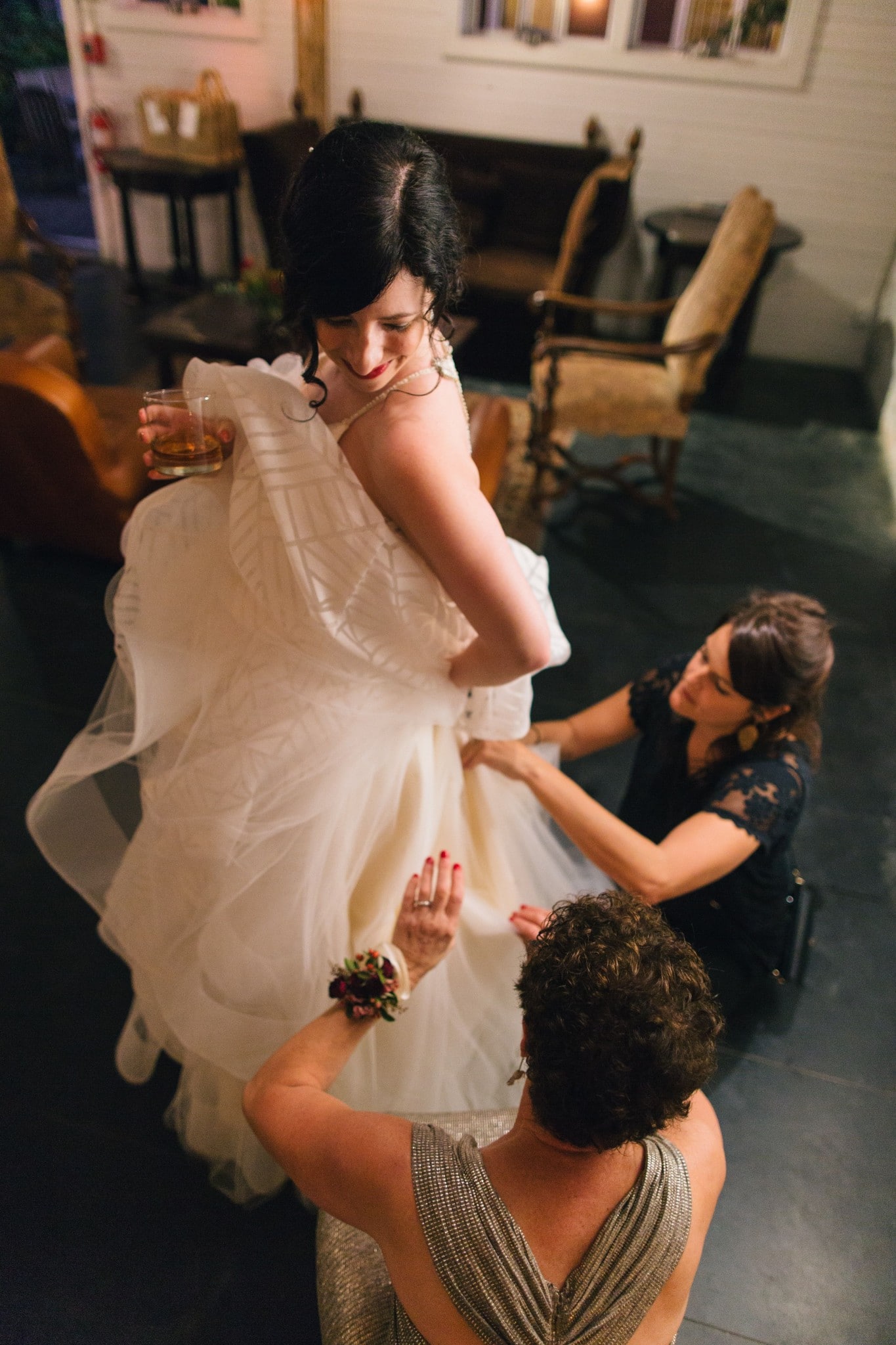We all know the stereotypes of wedding planners—a harried J-Lo touring venues and flower shopping with a focused bride and a not-so-interested (in the wedding at least) and overly-tactile Matthew McConaughey.
We also know that modern weddings are serious business—an over $50 billion dollar industry, in fact—with endless options for venues, dresses, flowers, food, invitations… the list goes on. Professional wedding planners can be a huge asset to couples looking to host a celebration, but many questions surround them, too. How do you find one, and what kinds of things can they help you with? Is your wedding too small to need a full-blown planner?
We caught up with Kasie Donoghue, Managing Director and Planner at EFD Creative – Event Planning & Design, a nationally recognized wedding and corporate event planning firm, to get her take on the wedding planning business and all the essentials you need to know.
We all know the move clichés, but what does a wedding planner actually do?
I think the best way to answer this question is by first pointing out the goal of a wedding planner, which is to help couples create a stress-free, seamless, and beautiful celebration. We of course, want them to enjoy the day-of events, but we also want them to enjoy the process of preparing and planning for the wedding.
Looking at specifics, each wedding comes with its own set of priorities and potential obstacles, so the individual tasks that we perform differ from couple to couple. However, in a general sense, I think it’s safe to say that planners assist couples in four primary ways:
1. They share their expertise both logistically, to make sure every detail is considered during the planning process, and thematically, to help couples create a cohesive look and feel throughout these details.
2. They save the couple time (and often money) by helping them navigate through the process of finding and booking vendors.
3. They help keep all the details organized by managing vendor orders and payments as well as keeping the couple on schedule with their “to do” list.
4. They oversee all wedding day logistics. From the wedding party to the vendors, the planner is there to make sure everything moves forward as intended and to find solutions as quickly as possible if something does fall out of line.

Photo credit: Zev Fisher Photography
When should you hire your wedding planner and how is the best way to find one?
The best way to find a planner is to simply ask around. Ask for recommendations from others in your circle and read reviews on third party sites like The Knot, WeddingWire, and Google. Hearing from others who have been in your shoes and/or have worked with a particular professional in the past is invaluable.
As far as timing goes, you can hire a professional at any point during your planning process. However, if you reach out at the very beginning, a planner will be able to help you avoid many of the common budgeting and booking mistakes that many couples make.
Are there things you should know about your wedding before approaching a planner?
The first things a planner will want to discuss are 1. your budget and 2. your priorities for the wedding. Be prepared with an understanding of how much you, your fiancé, and your families truly feel comfortable spending on the wedding as a whole as well as what elements of the celebration you would like to prioritize. Do you care deeply about the food? Are you all about the design? Your planner will work with you to figure out how much of the budget you should allocate to each vendor category based on your priorities and the funds you have available. Having a strong grasp of your budget and your spending priorities will help you avoid feeling out of control and will also ensure that you and your guests are able to enjoy the things that matter to you the most on your wedding day (…like that incredible band you’ve always wanted).

Photo credit: Zev Fisher Photography
Does your wedding have to be a certain size to require the services of a wedding planner?
No! Big or small, all weddings could benefit from budget planning, vendor planning, logistical planning, and general organization and management help.
In your opinion, what are the greatest advantages to hiring a wedding planner?
There are SO many advantages. They can save you time, money, and loads of stress. They also have the “inside scoop” on what’s going on within the industry, something our clients at EFD have found particularly helpful this year as we navigate the impact of COVID-19. We’ve been able to share what other brides, grooms, and vendors are doing in addition to giving our professional opinions and recommendations, and I think that’s helped couples make their own decisions during this unprecedented time.
Wedding planners are always ready with vendor recommendations. How do you choose what vendors to trust, and are couples free to use “outside” vendors that you haven’t worked with before?
At EFD, we spend a lot of our time networking and getting to know the different professionals in our industry to gain a solid understanding of who they are and what their product is. That way we can make personalized recommendations to our couples based on their individual needs rather than just handing everyone the same list of vendors.
Before sharing any recommendations, we consider the couple’s personality, vision, budget, and style and then provide a list of vendors that we think would be a good match based on this information. If the couple presents us with a vendor that they know and love but with whom we are unfamiliar, we do a little research and give the couple our honest opinion on whether we believe that vendor is the right fit for their vision. However, the final call is ultimately up to the couple.

Photo credit: Zev Fisher Photography
What’s something that couples always seem to find surprising about wedding planning?
Two things come to mind specifically:
1. At the beginning of the planning process, I think couples (and their parents) are surprised by the overall cost of a wedding. Weddings have changed dramatically since the older generations, and price tags in general have gone up. In addition, prices in the Northeast are higher than in other parts of the country, so simply googling “average cost of a wedding” can be misleading for people in New England. That’s why (again) it’s so important to plan out your budget before doing anything else.
2. Toward the end of the planning process, almost every couple we’ve worked with has commented on the massive number of details there are to plan, organize, and manage. SO much goes into a wedding… it can be really deceiving!
What’s one thing you wish couples knew about working with a traditional wedding planner?
This isn’t something I wish couples knew but rather something I always encourage couples to consider: for your guests, your wedding is just one five to six hour event, but for you, memories of your wedding will also include the entire time leading up to the big day. It’s the engagement, the planning process, getting ready the day-of, and then, of course, the event itself. As planners we want the whole process to be just as enjoyable as the party. After all, you’re engaged! Now is the time to celebrate and have fun.
Last but not least, are there any drawbacks to hiring a wedding planner?
The only drawback may be that it does come with an added cost for which the couple may not have originally accounted. However, EFD is on the forefront of developing new wedding planning options that are designed to help the cost-minded couple meet the challenges of hosting a modern wedding head-on.

Photo credit: Zev Fisher Photography
Stay tuned for part two of our Ask an expert series in which we get to know more about Kasie and the team at EFD, and how the strategic changes they’ve made to their services are changing the face of the wedding planning game.
***

